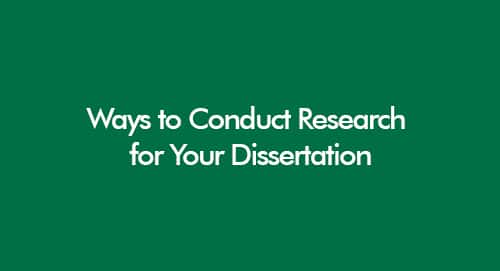
How to Write Citation? | A Practical Guide for Citation and References
October 26, 2022
How to Write References Quickly and Accurately? | A Practical Guide
October 26, 2022Writing research recommendations involves suggesting future research directions or actions that can be taken based on the findings of a research study. The most crucial element of the analysis process, recommendations, is where you provide specific suggestions for interventions or solutions to the problems and limitations found throughout the assessment.
Explore New Dissertation Ideas
Find Current Dissertation Examples
The following guideline will help you explore how to write recommendations:
What are the Recommendations?
Research recommendations are suggestions for future research based on the findings of a research study. The researcher may make these recommendations, or they may be requested by the publisher, funding agency, or other stakeholders who have an interest in the research. The purpose of research recommendations is to identify areas where further investigation is needed and to provide direction for future research in the field.
Get Help Through Our Proofreading Editing Services
The recommendation section, whether it is included in the discussion section or conclusion, should involve the following:
- The research questions that the recommendation addresses.
- A concise summary of the findings from the research.
- The implications of the findings for practice.
- The strengths and limitations of the research.
- How do the findings relate to other research in the field?
- Recommendations for further research.
What Kind of Recommendations Are Appropriate?
The appropriateness of recommendations depends on the research study and the research field. Generally, research recommendations should be based on the findings of the study and should address research gaps or limitations. Here are some types of recommendations that may be appropriate:
Finalise Your Topic After Getting Inspired by the Current Research Topics
1- Further Investigations
Suggest further investigations into specific research questions or hypotheses. This can include exploring new variables, testing different methods, or using different samples.
2- Development of New Research Methods or Techniques
Propose new research methods or techniques that can be used to address research questions or improve the quality of research.
3- Replication of the Study
Recommend replication of the study with larger or more diverse samples to increase the generalizability of the findings.
4- Extension of the Study
Suggest extending the study to different populations or contexts to explore the generalizability of the findings.
5- Collaboration with Other Researchers
Recommend collaboration with other researchers or research teams to leverage expertise and resources.
6- Integration of the Study Findings into Policy or Practice
Suggest ways in which the study findings can be used to inform policy or practice in the relevant field.
7- Addressing Limitations or Gaps in the Current Research Literature
Propose ways the study findings can address limitations or gaps in the current research literature.
Structuring of Recommendations
When learning how to write recommendations, start with structuring the recommendations section.
1- Summarize your Research Findings
Before making any recommendations, briefly summarise your study's key findings. This will provide context for your recommendations and ensure that they are relevant to the research topic.
2- Identify Research Gaps
Based on your research findings, identify gaps in the literature or areas requiring further investigation. Consider the limitations of your study and the potential implications of your findings.
3- Prioritize Recommendations
Determine the most important recommendations based on their potential impact and feasibility. You may want to organize your recommendations into short-term and long-term goals.
4- Provide Clear and Specific Recommendations
Your recommendations should be concise and specific. Avoid vague or general statements and provide actionable steps that can be taken to address the research gaps you have identified.
5- Justify Your Recommendations
Provide a rationale for each of your recommendations, explaining why they are necessary and how they will contribute to the overall research field.
6- Consider Potential Challenges
Be sure to consider potential challenges or limitations that may arise in implementing your recommendations. Provide suggestions for overcoming these challenges where possible.
7- Conclude with a Summary
End your recommendations with a brief summary of your main points. This will help reinforce the importance of your recommendations and ensure they are clearly understood.
Find Interesting Research Proposal Examples Here
Remember to tailor your recommendations to your specific research study and field of study. Keep in mind that your recommendations should be based on evidence and have practical applications for researchers, practitioners, or policymakers.
Building Concrete Research Recommendations
- The research process should be systematic and logical.
- Conduct the research in an objective and unbiased manner.
- The research findings should be reproducible.
- The research recommendations should be made with a concrete plan in mind.
- The research recommendations should be based on a solid foundation of evidence.
- The research recommendations should be clear and concise.
- The research recommendations should be achievable and realistic.
- The research recommendations should be made to further the research project's goals.
- They should be made to improve the quality of the research project.
- The research recommendations should make the research project more efficient.
- The recommendations should make the research project more effective.
- The research recommendations must aid in making the research project more successful.
What is the Smart Strategy for Writing Research Recommendations?
In academic writing, there are generally three types of Recommendations:
- Directives
- Options
- Obligations
Explore Some Best Dissertation Writings Here
Recommendations can be further characterized as "SMART" or "non-SMART." A SMART Recommendation is one that is Specific, Measurable, Actionable, Realistic, and Time-bound. The following sections will provide more information on each of these characteristics.
- A Recommendation is "Specific" if it clearly spells out what actions need to take place, who needs to take those actions, and when they need to occur.
- A Recommendation is "Measurable" if specified indicators can be used to gauge whether it has successfully achieved its objectives.
- A Recommendation is "Actionable" if the necessary steps required to implement the recommendation are spelt out and achievable.
- A Recommendation is "Realistic" if it is achievable given the available resources (e.g., time, money, human resources).
- Finally, a Recommendation is "Time-bound" if there is a specified timeframe within which the recommendation should be achieved.
What are the Dos and Don'ts of Research Recommendations?
Dos:
1- Be Specific
Provide clear and specific recommendations that are relevant to the research study and the field of study. Use precise language and avoid vague or general statements.
2- Support Your Recommendations with Evidence
Base your recommendations on the research study's findings and other relevant literature. Provide evidence to support your recommendations and explain why they are necessary.
3- Prioritize Recommendations
Identify and prioritise the most important recommendations based on their potential impact and feasibility.
4- Consider Practical Applications
Ensure that your recommendations have practical applications for researchers, practitioners, or policymakers. Think about how your recommendations can be implemented in practice and how they can contribute to the field.
5- Be Concise
Keep your recommendations concise and to the point. Avoid unnecessary details or explanations.
6- Provide a Rationale
Explain the rationale for each of your recommendations and how they will contribute to the overall research field.
Don'ts:
1- Make Unsupported Claims
Avoid making claims that are not supported by evidence. Make sure that your recommendations are based on the research study's findings and other relevant literature.
2- Overgeneralize
Avoid overgeneralizing your recommendations. Make sure that your recommendations are specific to the research study and field.
3- Ignore Potential Challenges
Consider potential challenges or limitations that may arise in implementing your recommendations. Provide suggestions for overcoming these challenges where possible.
4- Disregard Practical Considerations
Ensure that your recommendations are practical and feasible. Consider the resources and constraints of the research field and how your recommendations can be implemented in practice.
5- Be Too Prescriptive
Avoid being too prescriptive in your recommendations. Provide guidance and direction, but allow room for interpretation and adaptation.
By following these dos and don'ts, you can ensure that your research recommendations are well-supported, relevant, and practical and will make a meaningful contribution to the research field.
Learn the Best Way to Write Acknowledgements
Explore the Current Samples of Acknowledgement
Conclusion
It is frequently the case that further research is needed to facilitate the advancement of a study. In your research plans, you can analyze potential study methodologies and the points regarding a subject that might be covered in such research.
The recommendations you include in your paper could be crucial to your research. Make sure your essay has clear recommendations that are simple to implement, can be used effectively, and are not unduly complex or challenging in any other manner. If you need further help writing recommendations, contact us via email or web chat.




























